Some years, you drive down Randolph Street on your way to somewhere else, you see the giant line curling around the Virginia Theatre, and you say “What the –?” and then you remember it’s mid-April: Ebertfest. Understood, there are several internationally-known arts-themed festivals in this town, so sometimes we lose track. Then you’re totally gobsmacked when you find yourself sitting next to Spike Lee at the bar in Guido’s, or literally running into Jason Segal when you get your weekend coffee. Don’t be surprised this year, be prepared: read this preview, then go get some tickets or passes for our annual celebration of local guy done good, April 13th–17th.
Most years, Ebertfest opens with its best film and its best guest. Remember when Charlie Kaufman was here in this town to talk about Synecdoche, New York? That totally buys back the year that they started with Joe vs. the Volcano. I mean, I loved it, but it wasn’t the highlight of the fest. Maybe its an odds/evens thing (does Ebert even like Star Trek? I’m afraid to check) but this year seems to back to a strong start. Don’t stop there, though, keep reading to discover all of the handpicked offerings available, which Chaz states on her blog, are meant to emphasize the diversity in the film industry today.
WEDNESDAY, APRIL 13TH
7 p.m. Crimson Peak – with director Guillermo del Toro
 Crimson Peak is a lush, tactile, romantic gothic film. The plot is a mix of Charlotte Brontë’s Jane Eyre (1846), the Bluebeard fairy tale, del Toro’s earlier The Devil’s Backbone (2001), and Henry James’ The Portrait of a Lady (1881). Edith Cushing (Mia Wachowski) is a modern American woman with ambition who falls in love with the quiet, mysterious, and financially desperate Sir Thomas Sharpe (Tom Hiddleston). Edith is also charmed by Thomas’ sister, Lucille (Jessica Chastain), who seems to care deeply for her brother. While grieving for her father’s untimely death, Edith is whisked away to the Sharpe’s ancestral home Crimson Peak. Named for the blood red clay on which the estate sits, Crimson Peak turns out to hold more mystery and terror than love and comfort for Edith. She quickly learns why her mother’s ghost warned her long ago to “Beware Crimson Peak.” (Sarah Keim)
Crimson Peak is a lush, tactile, romantic gothic film. The plot is a mix of Charlotte Brontë’s Jane Eyre (1846), the Bluebeard fairy tale, del Toro’s earlier The Devil’s Backbone (2001), and Henry James’ The Portrait of a Lady (1881). Edith Cushing (Mia Wachowski) is a modern American woman with ambition who falls in love with the quiet, mysterious, and financially desperate Sir Thomas Sharpe (Tom Hiddleston). Edith is also charmed by Thomas’ sister, Lucille (Jessica Chastain), who seems to care deeply for her brother. While grieving for her father’s untimely death, Edith is whisked away to the Sharpe’s ancestral home Crimson Peak. Named for the blood red clay on which the estate sits, Crimson Peak turns out to hold more mystery and terror than love and comfort for Edith. She quickly learns why her mother’s ghost warned her long ago to “Beware Crimson Peak.” (Sarah Keim)
[Editor’s aside: I wanted this film to be scarier, despite the fact that I get nightmares easily and usually avoid horror films entirely. I have no complaints, however, with the ghosts: they are intricately crafted, gristly, and highly detailed.]
Be ready for the long line for this one, people — it’s not every day Guillermo del Toro just shows up. I’m sure the panel will be moderated, but have a good question ready, just in case.
THURSDAY, APRIL 14TH
1 p.m. Grandma, with director Paul Weitz and producer Andrew Miano
 Emotional and comedic powerhouse Lily Tomlin stars as Elle in Grandma, a short and smart film about family, feminism, and old favors. When Elle’s granddaughter Sage (Julia Garner) shows up on her doorstep in need of $600 for an abortion, Elle figures it’s high time to collect some old debts and sets out with Sage to raise the cash. Their journey, as you can imagine, becomes far more than just a road trip, however, and the audience is rides along with them through every emotional encounter, sharp commentary, and comedic moment. Director Paul Weitz (About A Boy, American Pie, Little Fockers) delivers a perhaps uncharacteristic but very poignant film that takes itself just serious enough and fails to waste any of its modest runtime. (Carly Smith)
Emotional and comedic powerhouse Lily Tomlin stars as Elle in Grandma, a short and smart film about family, feminism, and old favors. When Elle’s granddaughter Sage (Julia Garner) shows up on her doorstep in need of $600 for an abortion, Elle figures it’s high time to collect some old debts and sets out with Sage to raise the cash. Their journey, as you can imagine, becomes far more than just a road trip, however, and the audience is rides along with them through every emotional encounter, sharp commentary, and comedic moment. Director Paul Weitz (About A Boy, American Pie, Little Fockers) delivers a perhaps uncharacteristic but very poignant film that takes itself just serious enough and fails to waste any of its modest runtime. (Carly Smith)
[Editor’s aside: I liked this movie so much, I watched the special features. Paul Weitz says he wrote this play with Tomlin in mind, and I have no problem believing it. Also noteworthy is the brief but heart-wrenching-but-funny performance by Judy Greer.]
4 p.m. Northfork, with director Michael Polish
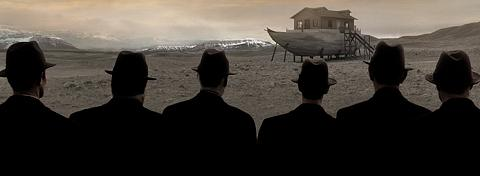
Supposedly the movie is set on the great plains of Montana in 1955, where government agents in dark suits and fedoras try to persuade (or force) rural citizens to abandon their homesteads before a newly finished dam switches on and floods the land. The central storyline is about an orphaned boy named Irwin (Duel Farnes), who was abandoned by his parents because he’s too sick to live much longer, and the shaggy-haired minister (Nick Nolte) who acts as the boy’s caretaker and tries to locate a couple that will adopt him. Meanwhile, the government agents, who’ve been promised lakefront property if they evacuate everyone in their sector, split up to convince the few remaining homeowners to leave. The film’s elliptical script is linear in the way that a half-submerged stepping-stone path across a river is linear. Its themes and ideas only connect when the viewer decides to participate emotionally—to set aside his or her perceived notions of what movies are (or should be) and hop from one rock to the next.
This is the third film by the Polish twins. Michael directs, Mark acts, and Mark and Michael co-produce and co-write. Northfork was given four stars in Ebert’s 2003 review, in which he described it as “not an entertaining film so much as an entrancing one.” (Review excerpt, Matt Zoller Seitz, Roger Ebert) (Shelly Chang)
[Editor’s aside: I ran across this DVD recently, and my first thought was “An ark? Well, hopefully there are no EMPs or rockmonsters in this one.” Then I saw it was an Ebertfest pick and that immediately raised my expectations. Then I read it was compared to Days of Heaven, and Wings of Desire, and the bar was raised impossibly high.]
8:30 p.m. The Third Man with script supervisor Angela Allen
 Praised for its incredible cinematography and its limited musical score, the Third Man, (1949) directed by Carol Reed, is about a young writer Holly Martins who travels to Vienna to visit his friend Harry Lime played by the late and great Orson Welles. This film reinvented the noir genre though being initially sparse in its story. Although Harry Lime’s death and events surrounding it may seem cliche by our standards, it is important to note that these elements we take for granted set the precedent for the revival of contemporary investigative films.
Praised for its incredible cinematography and its limited musical score, the Third Man, (1949) directed by Carol Reed, is about a young writer Holly Martins who travels to Vienna to visit his friend Harry Lime played by the late and great Orson Welles. This film reinvented the noir genre though being initially sparse in its story. Although Harry Lime’s death and events surrounding it may seem cliche by our standards, it is important to note that these elements we take for granted set the precedent for the revival of contemporary investigative films.
Despite being in black and white, The Third Man is a classic example of a good action film before the time of fancy schmancy special effects and blue-screen editing. The use of cinema rather than hyperealistic explosions may be quite sobering for any viewer. Additionally, while the film itself is quite well-known in our cinematic culture, it is widely outshined by Welles’ earlier film Citizen Kane. Attendees will be able to see his evolution into the icon that he would later become regardless of the incredible shadow Kane cast on his career as an actor as well. (Malik Purvis)
[Editor’s aside: The fact that the script is written by Graham Greene makes me simultaneously wary and intrigued, but I will always watch Orson Welles.]
FRIDAY, APRIL 15TH
1 p.m. Disturbing the Peace with documentary subjects and filmmakers

The Israeli/Palestinian conflict is arguably the oldest battle running: the fuel to this fire is centuries old, and has been passed down through generations. The subjects of Disturbing the Peace are ex-military from both sides who have lived it and have decided that rather repeating the story they’ve been fed since birth, it’s time to write a new one. Combatants for Peace are former fighters who are now using non-violent means: dialogue, theatre, and other cultural tools, to spread a message of peace. The panel will be made up of two organization leaders, one Israeli and one Palestinian, with both directors and a story consultant. It’s an incredible opportunity to listen, question, and learn. (rknaur)
4 p.m. L’inhumaine with the Alloy Orchestra
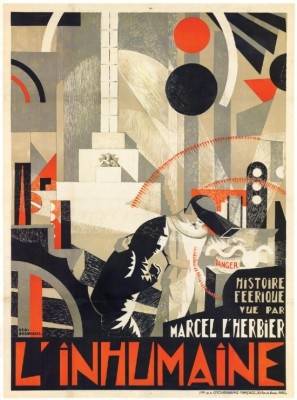 Although this silent film was released in 1924, my brain keeps connecting this one to our festival opener: Crimson Peak. Every review I’ve read of L’inhumaine has said, “The plot is a murder/mystery but it’s so not important because the costumes, the setting, it is the defining moment of Art Deco.” Which is almost exactly what I felt when I finished del Toro’s Gothic ghost-story, subbing the correct era, and I’m intrigued by the juxtaposition.
Although this silent film was released in 1924, my brain keeps connecting this one to our festival opener: Crimson Peak. Every review I’ve read of L’inhumaine has said, “The plot is a murder/mystery but it’s so not important because the costumes, the setting, it is the defining moment of Art Deco.” Which is almost exactly what I felt when I finished del Toro’s Gothic ghost-story, subbing the correct era, and I’m intrigued by the juxtaposition.
What else is intriguing is the Alloy Orchestra. Returning for at least the fifteenth time, with their signature “rack of junk” and synthesizers of special effects, I have always enjoyed seeing them score silents. It’s a trip. You should go on it. (rknaur)
TK
9 p.m. Eve’s Bayou with director Kasi Lemmons
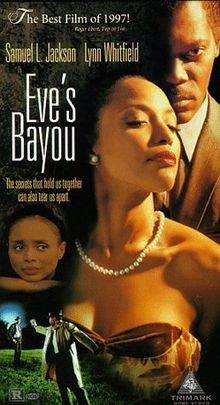 How is it that Samuel L. Jackson manages to contain the perfect ratio of handsome, dangerous, and asshole? In this mystery/thriller, he manages to keep his character respectable — a doctor with a beautiful wife in 60s New Orleans — while still loving every lady patient he likes. Seems standard patriarchal crap, but the story turns a corner by revolving around his doting youngest daughter, who believes she has managed to magically kill her father with voodoo after she caught him in a betrayal. Bringing together fragmented childhood memories and trying to reconstruct a story that she doesn’t entirely understand, Eve as an adult pieces together the events in a way that leaves the conclusion open to the audience’s interpretation. With the director in attendance, who knows, maybe we will finally discover the truth? (rknaur)
How is it that Samuel L. Jackson manages to contain the perfect ratio of handsome, dangerous, and asshole? In this mystery/thriller, he manages to keep his character respectable — a doctor with a beautiful wife in 60s New Orleans — while still loving every lady patient he likes. Seems standard patriarchal crap, but the story turns a corner by revolving around his doting youngest daughter, who believes she has managed to magically kill her father with voodoo after she caught him in a betrayal. Bringing together fragmented childhood memories and trying to reconstruct a story that she doesn’t entirely understand, Eve as an adult pieces together the events in a way that leaves the conclusion open to the audience’s interpretation. With the director in attendance, who knows, maybe we will finally discover the truth? (rknaur)
SATURDAY, APRIL 16TH
11 a.m. Force of Destiny with director Paul Cox
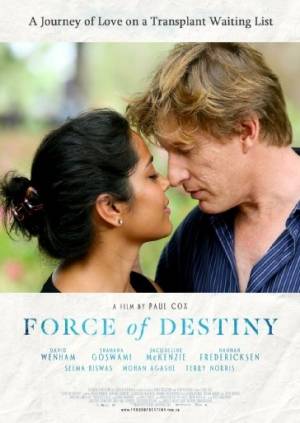 Paul Cox’s film Force of Destiny offers an intimate look into what happens when an individual is diagnosed with terminal cancer. The story focuses on Robert (David Wenham), a middle-aged sculptor whose life is uprooted when he finds out that he has cancer and will die if he doesn’t receive a liver transplant within six months. During this time, Robert meets and falls in love with Maya, a marine biologist from India whose uncle is also dying from cancer. Cox’s personal situation helped develop the general framework of the film, as he was diagnosed with liver cancer in 2009 and similarly given six months to live. He eventually received a transplant and during post-operative care, met and fell in love with another liver transplant recipient. Cox is a veteran filmmaker who has made over 40 documentaries, films, and shorts during his four-decade career as one of Australia’s few independent directors. (Jimin Shin)
Paul Cox’s film Force of Destiny offers an intimate look into what happens when an individual is diagnosed with terminal cancer. The story focuses on Robert (David Wenham), a middle-aged sculptor whose life is uprooted when he finds out that he has cancer and will die if he doesn’t receive a liver transplant within six months. During this time, Robert meets and falls in love with Maya, a marine biologist from India whose uncle is also dying from cancer. Cox’s personal situation helped develop the general framework of the film, as he was diagnosed with liver cancer in 2009 and similarly given six months to live. He eventually received a transplant and during post-operative care, met and fell in love with another liver transplant recipient. Cox is a veteran filmmaker who has made over 40 documentaries, films, and shorts during his four-decade career as one of Australia’s few independent directors. (Jimin Shin)
2 p.m. Radical Grace with documentary film crew and activist Father Michael Pfleger
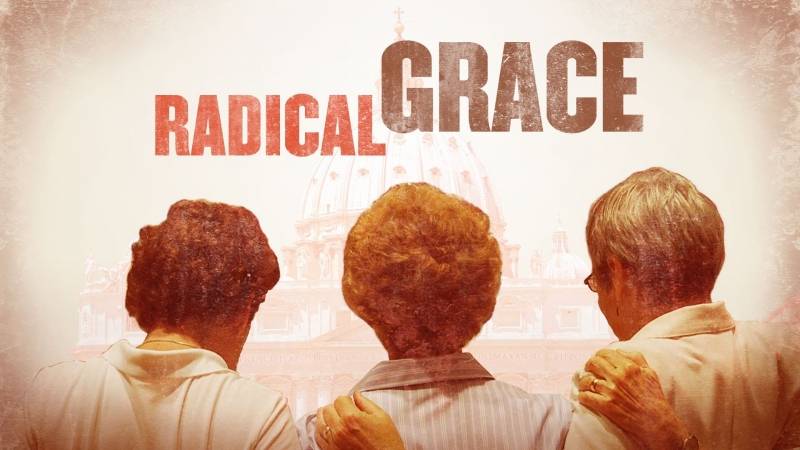
After the Vatican rebukes U.S. nuns for their “radical feminism”, three brave nuns risk their place in the Church and respond by engaging in social activism. Rebecca Parrish follows their fight to transform American politics and the Catholic Church in the 2015 documentary Radical Grace. One sister tackles Church patriarchy, protesting for women’s rights at the Vatican; another find hope in the former prisoners she counsels; and the third leads a cross-country “Nuns on the Bus” tour, leveraging the press attention that it gains to spotlight the needs of the poor. Rebecca Parrish is an award-winning filmmaker based in Chicago, where she has run her own film company, Interchange Productions, since 2007. (Jimin Shin)
[Editor’s aside: even if “women’s rights” weren’t a hot political topic right now, I’d be advocating this film because all of these Christians are trying to do good out in the world, despite the best efforts of their church’s governing body. Says it all.]
4:30 p.m. Love and Mercy, guests TBA
 Personally, I have a soft-spot for biographies about musicians and documentaries about how music evolves and changes with each generation. Love & Mercy is one of those films that fascinates me and hits that chord of satisfaction. This biographical film follows Brian Wilson, the singer/songwriter and maverick musician of The Beach Boys, in two parallel narratives. In one narrative, we see Wilson (played by Paul Dano) struggling with life on the road, making sense of the auditory hallucinations that he hears constantly, and his anxiety attacks from ever-increasing stress. In the other narrative, Wilson (played by John Cusack) meets his second-wife Melinda Ledbetter (Elizabeth Banks) following a supposed recovery from a complete psychotic break with the help of Dr. Eugene Landy (Paul Giamatti). The trajectory of both narratives along with Atticus Ross’ score, which samples from the original master tracks for The Beach Boys’ Pet Sounds sessions, makes for a compelling film about a troubled and gifted musical innovator. (Sarah Keim)
Personally, I have a soft-spot for biographies about musicians and documentaries about how music evolves and changes with each generation. Love & Mercy is one of those films that fascinates me and hits that chord of satisfaction. This biographical film follows Brian Wilson, the singer/songwriter and maverick musician of The Beach Boys, in two parallel narratives. In one narrative, we see Wilson (played by Paul Dano) struggling with life on the road, making sense of the auditory hallucinations that he hears constantly, and his anxiety attacks from ever-increasing stress. In the other narrative, Wilson (played by John Cusack) meets his second-wife Melinda Ledbetter (Elizabeth Banks) following a supposed recovery from a complete psychotic break with the help of Dr. Eugene Landy (Paul Giamatti). The trajectory of both narratives along with Atticus Ross’ score, which samples from the original master tracks for The Beach Boys’ Pet Sounds sessions, makes for a compelling film about a troubled and gifted musical innovator. (Sarah Keim)
[Editor’s aside: Paul Dano sang all those parts himself. Not even kidding. So what I watched the special features on this one, too. Also, every primary actor in this film should consider this an open invitation to visit Champaign, just sayin.]
9 p.m. Blow Out with actress Nancy Allen
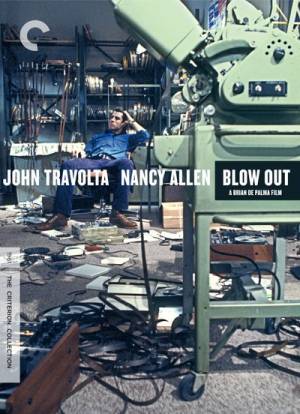 In Brian De Palma’s mystery-thriller Blow Out, John Travolta plays the role of a movie sound recordist. One night he happens to witness and record a car accident wherein the car has a blowout that forces it to swerve off a bridge and into a river. Travolta dives after the car, managing to save one of the passengers (Nancy Allen); he later learns that the driver of the car was a potential presidential candidate. As he’s reviewing the sound recording of the incident, he becomes convinced that he hears a gunshot just before the blowout, forcing him to question the true nature of the incident. Nancy Allen is an American actress best known for her roles in Carrie, RoboCop, and Dressed to Kill. (Jimin Shin)
In Brian De Palma’s mystery-thriller Blow Out, John Travolta plays the role of a movie sound recordist. One night he happens to witness and record a car accident wherein the car has a blowout that forces it to swerve off a bridge and into a river. Travolta dives after the car, managing to save one of the passengers (Nancy Allen); he later learns that the driver of the car was a potential presidential candidate. As he’s reviewing the sound recording of the incident, he becomes convinced that he hears a gunshot just before the blowout, forcing him to question the true nature of the incident. Nancy Allen is an American actress best known for her roles in Carrie, RoboCop, and Dressed to Kill. (Jimin Shin)
[Editor’s aside: don’t be distracted by Travolta’s involvement – focus on the De Palma.]
SUNDAY, APRIL 17TH
Noon Body and Soul with Renee Baker and the Chicago Modern Orchestra Project
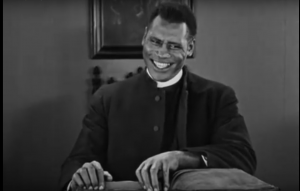 In this silent film, Paul Robeson stars as swindler Black Carl, an escaped convict posing as a man of the cloth. As Reverend Isaiah T. Jenkins, Carl sets out with his partner and ex-jailmate “Yello’-Curley” Hinds (Lawrence Chenault) to hoodwink the congregation. Sister Mary Jane (Mercedes Gilbert) is more than willing to give her contribution to the “right reverend” Jenkins, but what she doesn’t realize is that Jenkins has set his carnal sights on her daughter Isabelle (Julia Theresa Russell). Body & Soul is the familiar tale of “beware the wolf in sheep’s clothing,” but its focus from an African-American perspective in the 1920s gives the visual narrative something unique. At Ebertfest attendees will get the chance to hear a score for the film by Composer/Music Director Renee Baker and the Chicago Modern Orchestra Project. First performed at the 2015 Black World Cinema Film Series in Chicago, Baker and CMOP will bring a new musical dialogue to this Jazz Age piece of cinema. (Sarah Keim)
In this silent film, Paul Robeson stars as swindler Black Carl, an escaped convict posing as a man of the cloth. As Reverend Isaiah T. Jenkins, Carl sets out with his partner and ex-jailmate “Yello’-Curley” Hinds (Lawrence Chenault) to hoodwink the congregation. Sister Mary Jane (Mercedes Gilbert) is more than willing to give her contribution to the “right reverend” Jenkins, but what she doesn’t realize is that Jenkins has set his carnal sights on her daughter Isabelle (Julia Theresa Russell). Body & Soul is the familiar tale of “beware the wolf in sheep’s clothing,” but its focus from an African-American perspective in the 1920s gives the visual narrative something unique. At Ebertfest attendees will get the chance to hear a score for the film by Composer/Music Director Renee Baker and the Chicago Modern Orchestra Project. First performed at the 2015 Black World Cinema Film Series in Chicago, Baker and CMOP will bring a new musical dialogue to this Jazz Age piece of cinema. (Sarah Keim)
[Editor’s aside: two silent films in one fest seems pretty ballsy, but I know both musical groups will make these unforgettable experiences. With both groups and films being so different, you won’t feel stuck in a rerun by going to both.]
This year’s schedule does indeed embody “inclusivity”, with directors, films and topics across the board representing many genders, ages, races, and countries. To keep that theme rolling, this is also the first year for the “Ebert Humanitarian Award”, to be presented to the film which displays the most empathy. So fit something in your schedule, or clear your schedule, and “I’ll see you at the movies.”








